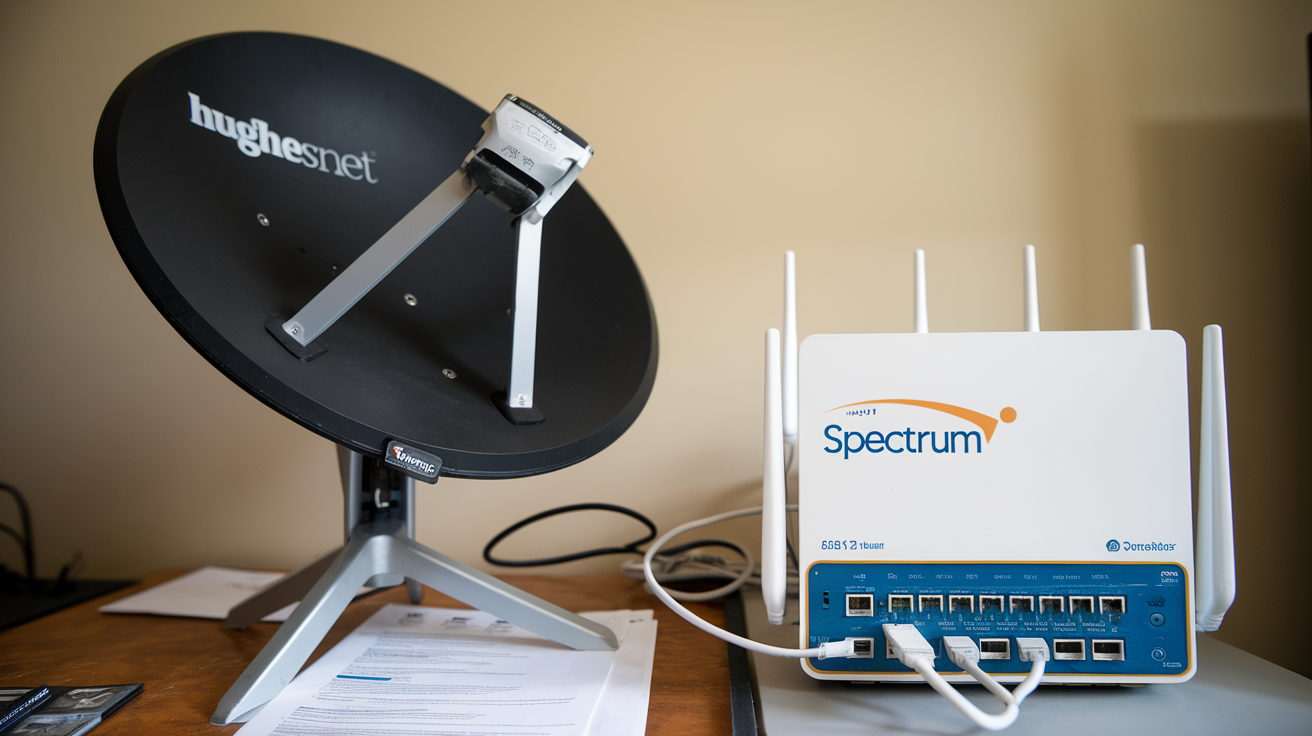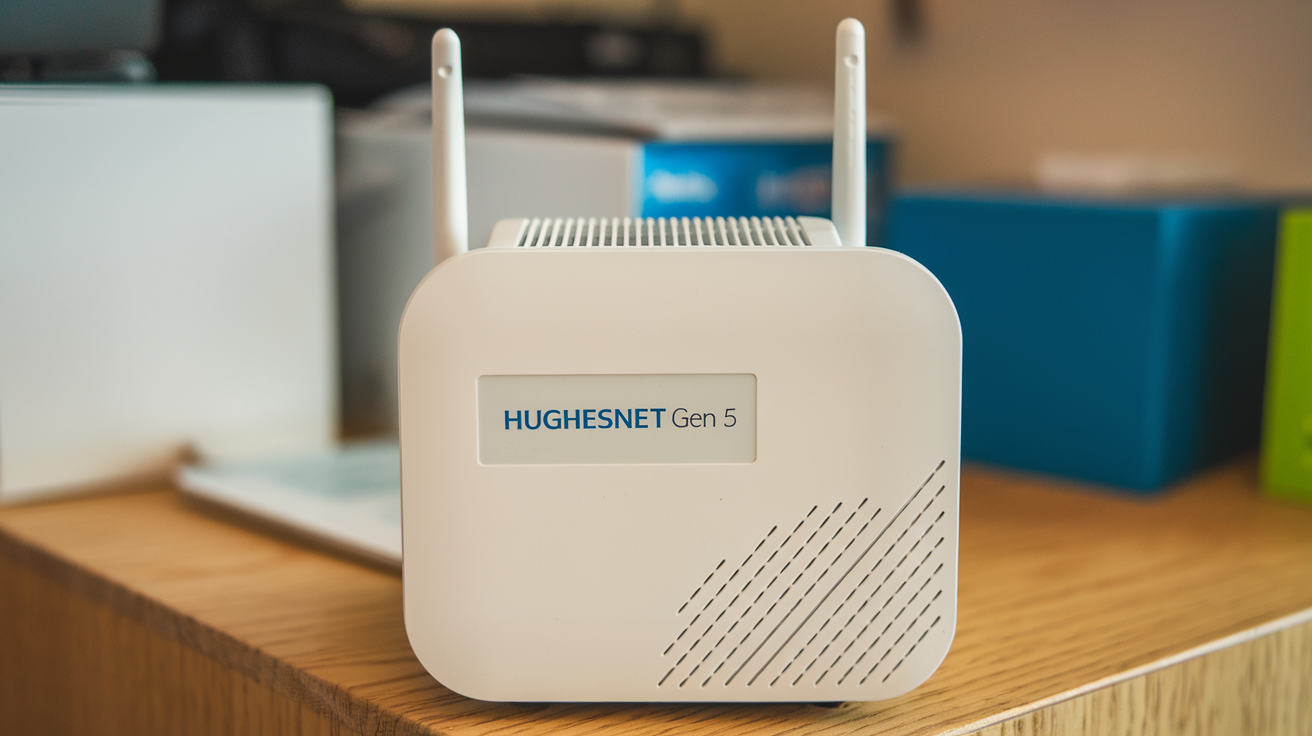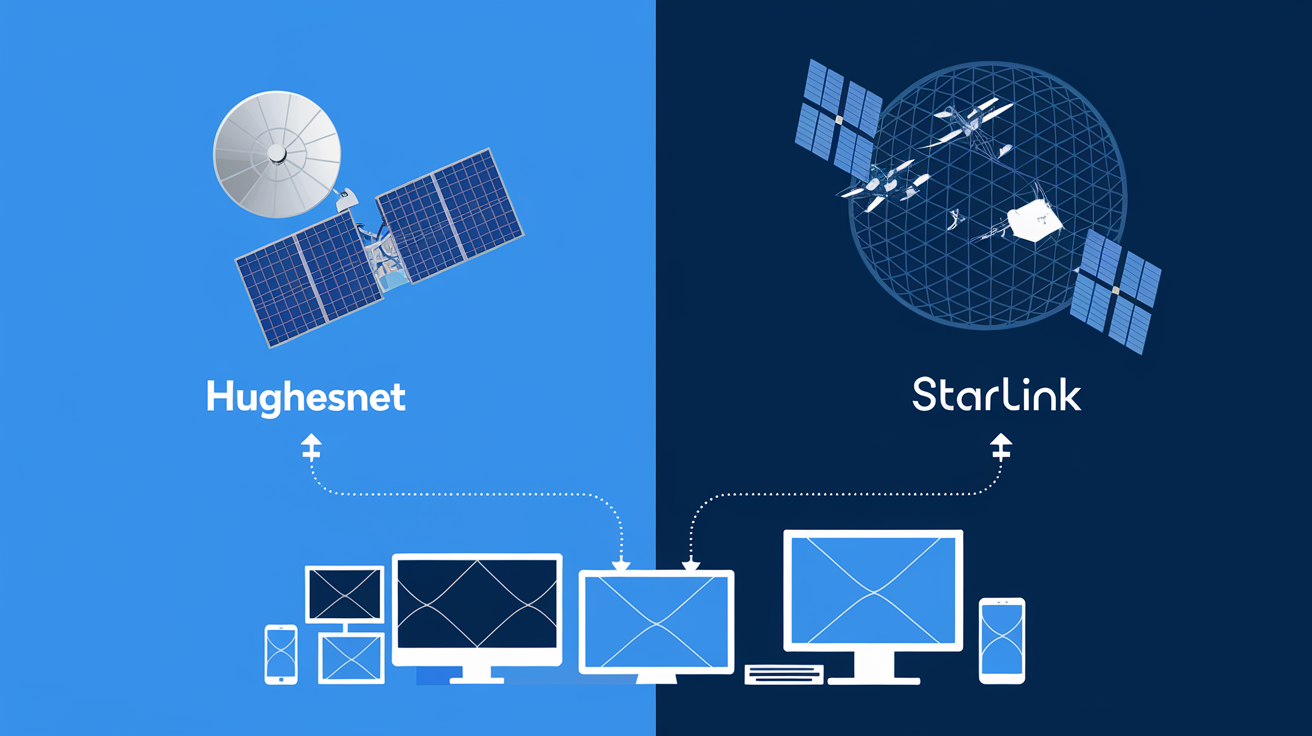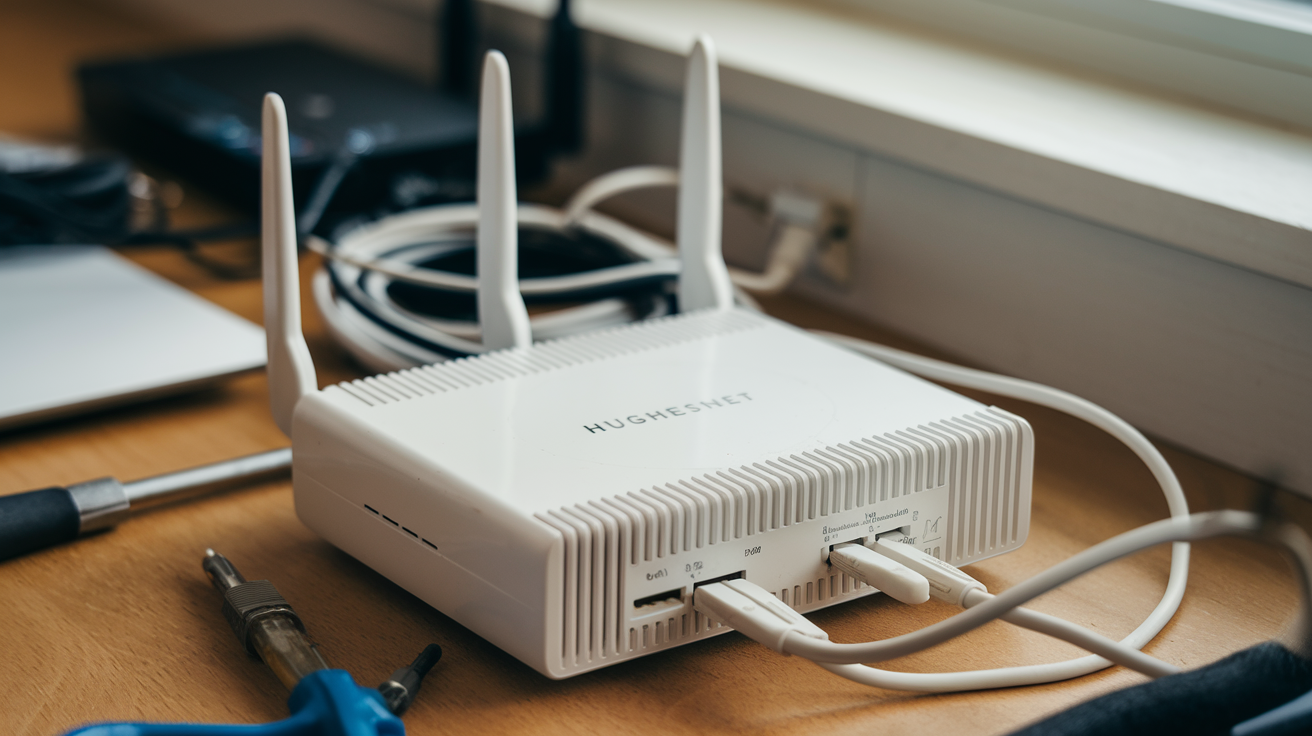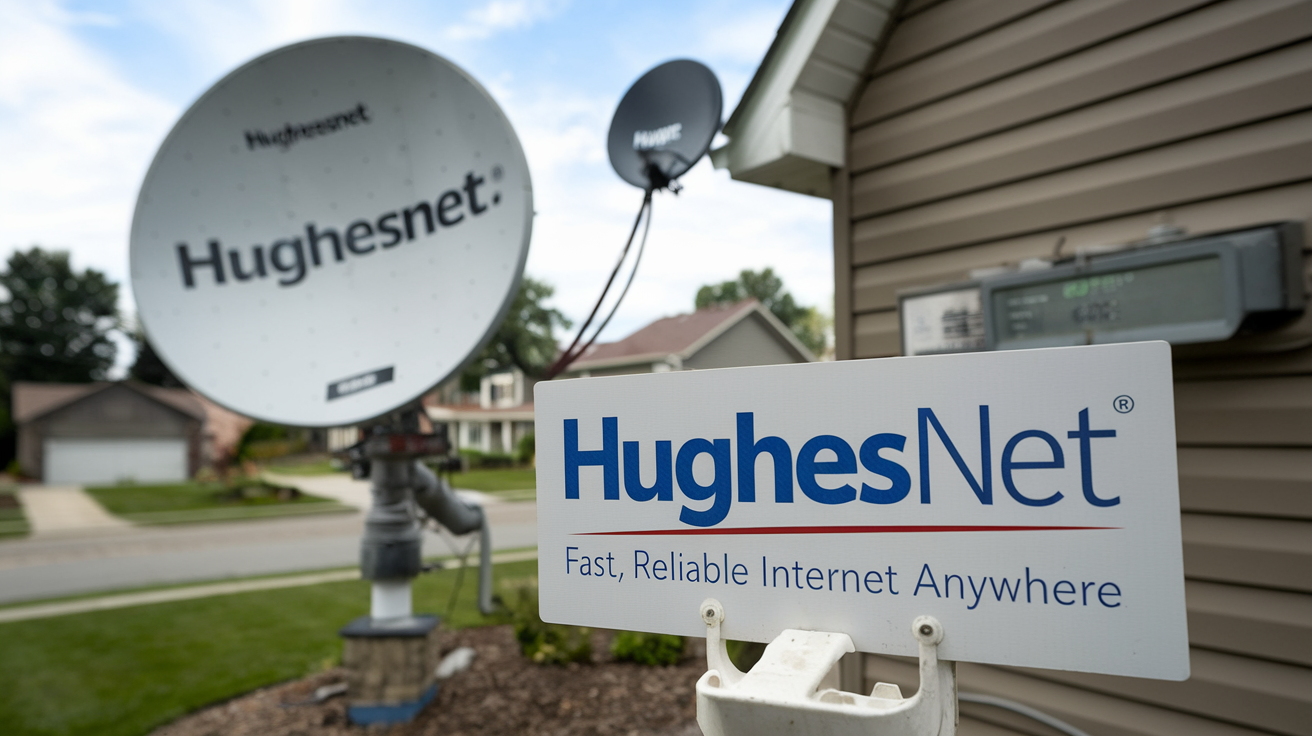-
Posted on: 08 Aug 2024

-
Hughesnet is one of the largest satellite internet services provider based in the USA and has the biggest market share in the area where cable and Fiber optic broadband internet is not available. However, the mentioned provider, Hughesnet, has some essential disadvantages that push people to look for a better option. All right, so in this article, we will be looking at what Hughesnet has to offer and whether there is anything better than this.
Speed and Data Caps
When it comes to Hughesnet’s shortcomings, the most common issues are that their internet speeds are not very high, and the data usage is limited to a particular quantity per month. Hughesnet is many people’s go-to ISP, and the quickest plan it currently provides is 25Mbps download speeds, but that’s the best-case scenario peak speed. Prospective users should however note that actual speeds frequently hover around 10 to 15 Mbps.
Moreover, Hughesnet internet packages have very tight data allowances for every plan, which range from 10GB to 50 GB. If you go above the allowance, the speeds will be slowed down for the remainder of your bill cycle. This data plan can prove quite restrictive, especially for those homes with multiple internet users or those who stream shows and movies frequently.
In light of that then what is faster and has more data? Modern cable internet services provide at least 50-100Mbp with no limitations to data transfer as seen in the past. Fiber optic internet is even faster with speeds of up to 1Gbps offered by AT&T Fiber and Verizon Fios among others. High-speed internet is always provided and most of the time comes with unlimited data through cable and fiber plans. Of course, there is a flip side to it and these wired networks are not available at all places; especially in the country. However, if you can hook up to wire then go for it, it has a better performance than Hughesnet in terms of speed and data limit.
Reliability
Another frequently cited issue relates to reliability – satellite internet connection is often unstable and prone to interruptions. Signal quality and strength may be affected by adverse weather conditions such as rainfall, wind, and even snow. This way, trees, and terrain can also interfere with the signals. There could be limited speed and interrupted connections whenever there’s interference from weather or any physical barrier between the satellite dish and the signals coming from outer space.
Wired internet providers such as DSL and cable have relatively better uptime and performance as the cables and fiber lines are mostly buried underground which are safe from weather spoils. If wired networks are already present in your locality, then wired networks give an overall better reliability than satellite internet.
Latency
Another fact about satellite internet is that it must have higher latencies, or lag, because of the vast distances that the signals have to cover back and forth through space. This causes latency and instability, which are extremely inconvenient in real-time applications such as video conferencing and gaming that require instant response. Hughesnet has an average latency of 600 milliseconds which is a bit high but it still qualifies as high-speed internet although the delay time can be easily observed.
At the same time, wired cable and fiber providers have a much lower latency rate because their networks do not rely on space satellites. This means that the majority of cable and fiber services offer a latency of less than 50 milliseconds, which in turn, contributes to a smoother internet experience for gaming, video calls, live streaming, and other tasks that require low latency.
Affordability
Hughesnet offers a variety of plans that cost between $60 to $150 per month for basic service and equipment fees, data overage charges, and certain contractual terms. Hughesnet, while not inexpensive, is one of the few choices rural folks have for accessing the Internet, albeit at the cost of service consistency.
If you broaden your choices to consider options such as using free Wi-Fi at various locations like cafes, restaurants, and airports, using mobile internet delivered through 4G/5G networks, and the latest low earth orbit satellite service providers, then your choices are significantly larger. While this will be more costly initially than Hughesnet, getting a wired connection through cable or fiber will offer the best cost-benefit over the long run if the services are available in your area. Some of these we will discuss in detail later on will be;
Better Satellite Alternatives
While it is possible to get a Hughesnet satellite connection that has a significantly lower speed and higher latency, newer satellite options offer higher speeds.
Starlink is another SpaceX project which is the constellation of low Earth orbit satellites that aims to provide internet connection all across the globe. Since the internet service of these satellites is 60 times closer to the earth than traditional satellite internet services, latency can be reduced to between 20-40 milliseconds which are almost similar to those of the wired internet services.
Starlink also provides download speed between 50-200+ Mbps while it does not limit the users with severe data limits. With the continuous expansion and advancement of the network, Starlink stands to outcompete Hughesnet in terms of speed, latency, and the value of money. The drawback is that availability remains an issue as more launches happen, and extremely high demand may extend the time for pre-orders to over half a year. However, Starlink should replace Hughesnet if it is already operational in your region.
Viasat is another next-gen satellite internet provider that aims to use high-capacity satellites for higher speed and without restrictions in terms of data usage. Nonetheless, latency levels have not caught up with the newer low Earth orbit rivals, and services experience reliability problems in bad weather.
Cellular & Public Wi-Fi
Of course, there are other ways, and one such way is to use mobile hotspot data from your cellular provider to get more internet than Hughesnet offers. It however differs depending on the coverage of the network and the traffic density where you are located and data is commonly limited to 10-100GB per month for a standard plan but can cost high for more data allowance. However, in the long run, dedicating a smartphone as a hotspot simply cannot rival the price and speed of wired/fiber high-speed services if offered.
Other sources of connectivity include the use of available hotspots with public wi-fi as an added plus while on the go. It has limited speed on open public networks and in most cases is unpredictable and the security is unguaranteed. For instance, while some establishments such as coffee shops may offer open networks that are insecure with poor connection speeds and limited free data, there could be a pay-per-usage or VIP password that provides patrons relatively secure connections at higher speed for a limited time. Another option you can turn to is public Wi-Fi, which may be useful in your case when you cannot rely on Hughesnet’s slow connection speed and strict data limits.
The Bottom Line
Though satellite-based services like Hughesnet et al, have offered rural users some form of internet connectivity with commendable performance, it still has their drawbacks in terms of speed, latency, data, and reliability as with satellite technology. While satellite internet like the Starlink satellite and better cellular signals like 5G will be available to even users in the countries, the citizens will be able to find better solutions for faster and cheaper internet. Up until then, wired/fiber internet is the only option to provide the best performance in gaming, streaming, and general internet use if the infrastructure is available in your location. Even with the disadvantages of high costs, limited bandwidth, high latency, frequent interruptions of the service, and prices of equipment, one is likely to get a better connection with almost any other network than Hughesnet.
